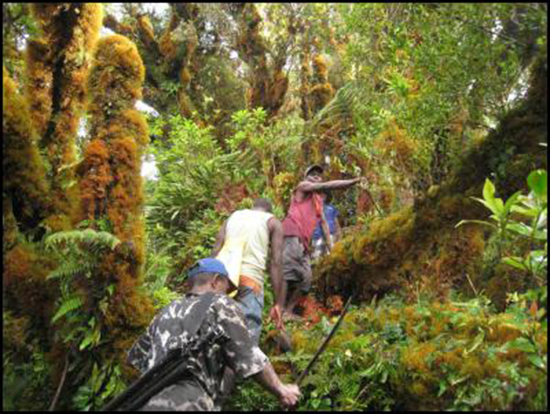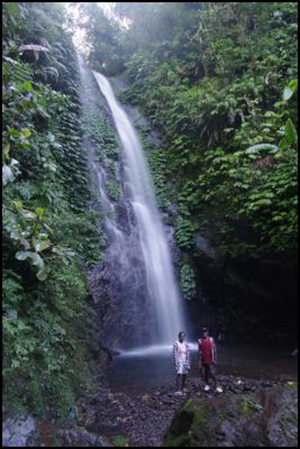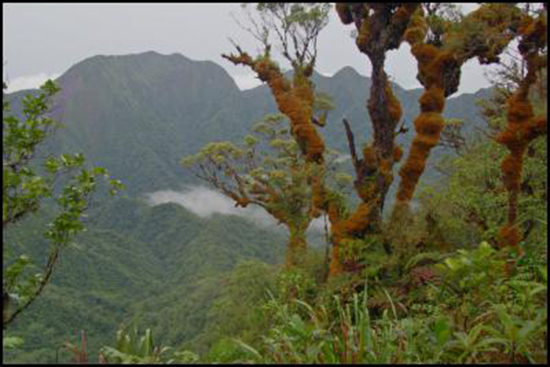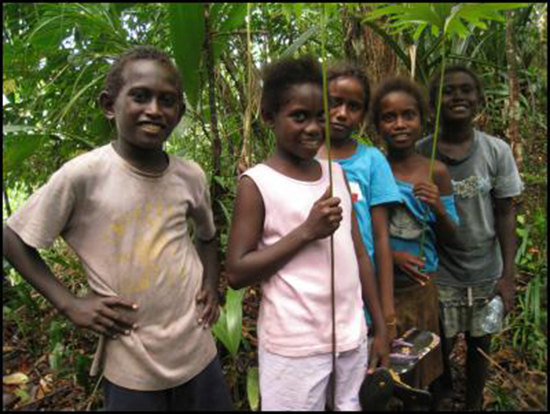
A collective of indigenous landowners have formed an association that is testing the strength of the Solomon Islands’ environmental law and taking their own national government to court over alleged irregularities in the way it gave the green light to a logging company, writes Dr Kayt Davies.
SPECIAL REPORT: The cloud forest is in danger and logging companies are part of the problem but, in this case, the fight’s moved on. Now the Solomon Islands government is facing legal questions and work is underway on the real challenge of getting people with genuine developing world needs to find consensus - and that costs money.
Kolombangara is just one of many thousands of islands in the South Pacific. Dazed by the beauty of the whole archipelago that is the Solomon Islands, this one may not immediately seem remarkable, but its own people care deeply and the progress they are making in protecting it is slow but groundbreaking.
These are not spear-wielding noble savages holding logging trucks at bay. They are a collective of indigenous landowners who formed an association that is testing the strength of the fledgling nation’s environmental law and taking their own national government to court over alleged irregularities in the way it gave the green light to a logging company.
Viewed from above, Kolombangara is almost perfectly round and about 30km across. From ground level it towers dark green over 1770m high, with its peak hiding shyly in a veil of cloud.
Few visitors
Only a few intrepid travelers visit. Hikers who tackle the mud and vines find that the vegetation changes at about 400m above sea level, beyond that point they are engulfed by the "cloud forest" – a biodiverse wonderland that is home to several species of birds and frogs found nowhere else in the world. The forest is also home to a network of "Tambu" sites – places important to the history and culture of the people who have lived on the island for more generations than anyone can remember.
Most of the 6000 or so people of Kolombangara live in huts made of timber and leaves hacked from the bush with chainsaws or enormous bush knives. If they have light at night, it comes from kerosene or solar lamps, or the few diesel generators in the larger towns. Most homes have no plumbing, but water is easy to access from the many streams that course down the steep sides of the towering old volcano.
Conversations take place in Nduke, the island’s local language, Roviana, a language shared with nearby islands or Solomon Pidgin. English is reserved for talking to visitors. Most children go to school and most people go to church.
There are about 90 small villages scattered around the outskirts of the volcano, and a few larger settlements. The most developed town, Ringgi owes much of its infrastructure to Kolombangara Forests Products Limited (KFPL), a timber company that has had Forest Stewardship Council (FSC) certification since 1998.
Stewardship in action
KFPL was 100 percent owned by the Solomon Islands government until April 2011 when a Taiwanese firm called Nien Made Enterprise bought 60 percent, declaring as it did that it was keen to keep the FSC status, that requires it to meet environment and social standards.
 While KFPL’s 75-year lease covers about 70 percent of the island and extends up to the crater rim, it restricts its commercial activities to the part of that land below the 400m above sea level mark and allows traditional owners to access and co-manage the cloud forest portion of the land.
While KFPL’s 75-year lease covers about 70 percent of the island and extends up to the crater rim, it restricts its commercial activities to the part of that land below the 400m above sea level mark and allows traditional owners to access and co-manage the cloud forest portion of the land.
It also provides vital infrastructure support to the Kolombangara Island Biodiversity Conservation Association (KIBCA), a community organisation established in 2008 to “protect Kolombangara Island’s rich marine and forest biodiversity and to educate, promote and encourage sustainable management of natural resources through viable economic and social ventures.”
It is KIBCA that is pursuing a judicial review of decisions by key government officials to sign approvals for Success Company Ltd to log an area that includes some of the cloud forest.
Fighting law with law
The legal framework that the people of Kolombangara are trying to work within is the product of the nation’s long political history.
Customary law is the term now given to the rules that evolved over millennia to govern island life, such as land and water rights, marriages and settling disputes. While ancient in its origins, customary law is still alive and well in the Solomons and it governs the lives of many, especially in remote areas.
The first Europeans to visit the Solomons came in 1568. Not much changed immediately after their visit but by the 1800s whalers, traders and missionaries were arriving. By the end of the century, contention over British and German control over various Pacific islands was resolved under a treaty that gave Germany more of Samoa and the UK control of all nine of the major island groups in the Solomons.
During the British period a big priority was ending the practice of head hunting that was a common means for settling disputes between villages. Missionaries did a lot of this work and Christianity is now wide-spread. While head hunting doesn’t happen anymore, this transition was damaging to traditional tribal structures and empowering to the government. Schools were established during this time and logging saw swathes of forests cleared. In some places, such as Kolombangara, plantations were established.
The UK granted the Solomons independence in 1978 and the young nation’s 50 member house of parliament started drafting legislation, with the safety net of British law still applying unless it’s overridden by the Constitution, an Act of Parliament, Customary Law or a judicial decision that declares it to be inappropriate.
Other quirks in the new constitution included a provision that, in general, only a Solomon Islander or certain groups, such as companies majority-owned by locals, can own land; and a provision that recognises Customary Law as a source of law.
The key logging law is the Forest Resources and Timber Utilization Act (1969) that requires logging companies to do three things before they can start felling trees: to enter into an agreement with landowners; to obtain a licence from the Commissioner for Forests (who is appointed by the Minister for Forests); and to get extra permission for logging over 400m above sea level.
In addition, the Environment Act (1998) requires logging companies to conduct an Environmental Impact Assessment and to obtain a ‘development consent’ or to get an exemption from the Director of the Environment and Conservation Division.
On paper this seems to be geared towards empowering local communities to protect resources in order to make their villages sustainable. But in reality the Solomons have been logged unsustainably for decades, in many cases with few benefits flowing back to the local communities.
What is remarkable about KIBCA’s action is rather than being defeated by the complexity of the laws and the lax way they are sometimes administered, they are using the courts to argue for the rights enshrined in the legislation.
The first court case
It all started in 2009 when Success rolled in its trucks and started logging an area known as Lot 1. KIBCA investigated and found that while Success had a licence; it hadn’t done an "Environmental Impact Assessment" and it hadn’t obtained the "Development Consent" required by the Environment Act. It also had not obtained permission for logging over 400m required by the Forest Resources and Timber Utilisation Act.
So in July 2010, KIBCA took the bold move of filing an application in the High Court of the Solomon Islands, seeking to restrain Success and its contractor from logging. In August 2010 Justice Chetwynd agreed to hear the matter and granted a temporary injunction that stopped the trucks and chainsaws.
According to Stephanie Price, an Australian lawyer who worked on the case, one of KIBCA’s most significant victories so far was gaining recognition of its right to bring that legal action. In the 2010 case, Success claimed that KIBCA "lacked standing" to make a claim because it was a group representing landowners and not a landowner, in itself. The High Court rejected this argument and Price said: “This was important because it paves the way for other landowner and environmental groups to challenge decisions that are contrary to environmental laws.”
Without this recognition by the judge, KIBCA would have been required to get official permission from the Attorney-General before it could “seek enforcement of public rights”, and its request for this permission had been knocked back.
In November 2010, KIBCA was back in court making its case about the lack of proper permissions and it won. Justice Chetwynd upheld his injunction against logging, pending the granting of the proper approvals.
Yes, Minister
But in the background other things had been happening. In August 2010, Heinz Horst Bodo Dettke, who owns two thirds of the shares in Success, was elected as a Member of Parliament and also appointed as the Minister for Forests.
In September 2010, the Commissioner for Forests (who works under the Minister for Forests) granted approval for logging above 400m.
Then in March 2011, the Director (from the Ministry of Environment) granted Success a "development consent". According to the Act, Success needed to conduct an Environmental Impact Assessment before getting a development consent, and so Success had hired a consultant to do one. The consultant spent just one day on the island making the assessment.
KIBCA was told nothing about these approvals though, and in June 2011 it welcomed then Prime Minister Danny Phillips to its shores and celebrated when he dedicated all of the 20,000 ha above 400m on Kolombangara as a special area for conservation. The feel-good declaration, however, lacked any legal clout and may have just been pretty words.
Andrew Cox is an Australian who was at the Kolombangara Festival in June 2011. He was working as a volunteer with KIBCA and said that when the KIBCA board heard rumours that the approvals had been granted and that no one had bothered telling them, they were exasperated and suspected that it was “a sign of the same old practices that they were sick of, involving corrupt logging approval processes”.
In the following weeks Cox travelled to the capital, Honiara, to find out what had happened and he provided KIBCA with confirmation that the approvals had been granted.
KIBCA was furious and in July 2011 it filed an appeal to the "Environmental Advisory Committee" against the director’s decision to grant the development consent. That appeal is still languishing in a queue, waiting for the attention of the committee, which has drifted apart and isn’t holding meetings.
The second court case
Undeterred, in November 2011 KIBCA applied to the High Court for a judicial review and the quashing of both the Commissioner’s approval for logging over 400m and the Director’s Development Consent.
Among other things, KIBCA is claiming that the Environmental Impact Assessment doesn’t meet the requirements in the Environmental Act and that the Director took into account “an irrelevant consideration” which was that the Commissioner had given logging over 400m the go ahead.
In August 2012 the Attorney-General, representing the commissioner and director, filed a defence denying any wrongdoing.
The wheels of justice are turning painfully slowly. In June 2014 the parties met to put before the court the agreed facts, and according to Martha Manaka, senior legal officer with the Solomon Islands government’s Landowners’ Advocacy and Legal Support Unit, there’s a chance that the court date may be set before the end 2014.
Manaka stressed the importance of the case, saying that it “sets a precedent in terms of how companies deal with gaining ‘development consents’ for logging and other activities".
But while she and KIBCA are hoping for success, winning the court case does not guarantee long term protection.
As Price points out: “Even if the case succeeds and the High Court declares that the existing Development Consent and 400m approval are invalid, the Director of Environment and the Commissioner of Forests could just grant those consents again.”
A more permanent fix
Ferguson Vaghi, the co-ordinator of KIBCA, is frustrated but tenacious.
Despairing at the grinding slowness of the case he said: “If the court cases were fast and the companies were punished for not following the law then the system would work. But that’s not how it is.”
But looking on the brighter side he added: “The good thing about the case is that it has slowed down the logging activities and it has given us time to work on more permanent solutions.”
KIBCA’s new plan of action is to get the area above 400m designated as a National Park under the Protected Areas Act 2010, which would make it illegal for the director and commissioner to grant approvals for logging.
This is a long process though, because it requires all of the landowners to consent, and there are some Kolombangara people who see ‘locking up forests’ as akin to giving them away for no return.
As Vaghi explains: “It’s a local mentality that can be overcome by doing what we are doing. We are used to depending on the forest for almost everything, so if we are going to stop people from making money from the forest we have to find incentives and offer alternatives.”
He elaborates that this means finding other ways of monetising the forest, such as eco-tourism, agro-forestry, honey production and other sustainable industries.
While this sounds good, Dr Ian Scales, whose PhD focussed on logging and land politics on Kolombangara, is concerned that the process of gaining approval from all the landowners will be difficult because there is an undertide of power politics, an attitude of elitism among the ‘big men’ and a reluctance to cede power.
He said: “The competing narratives will make it hard.”
Elaborating he explained that the nation’s current PM Gordon Darcy Lilo, who hails from Kolombangara, is a big player who made part of his fortune from logging, that included some above the 400m mark. According to Dr Scales, Gordon Darcy Lilo is keen to take the decisions about logging out of the hands of local chiefs and to have the decisions made in Honiara. Competing against this perspective are the views of other influential people, such as Luma Darcy, who are keen for Kolombangara to maintain its independence.
Despite these gloomy predictions, Vaghi seems pragmatically optimistic. He said: “It’s not difficult, it’s just that money talks. When we can offer money, we get agreement. It’s taking time but we have money coming soon from the United Nations Development Programme and when that comes we will make more progress. It’s the way forward as far as I can see.”
In the meantime, Manaka in the Landowners’ Advocacy and Legal Support Unit office is getting her papers in order and preparing for a court battle in the next few months.
Dr Kayt Davies is a senior lecturer in journalism at Edith Cowan University, Perth, WA, and is also editor of Research Journalism. This article was originally published by Scoop.





